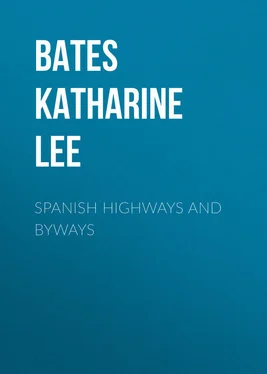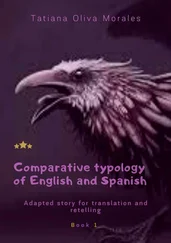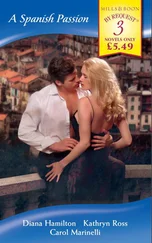Katharine Bates - Spanish Highways and Byways
Здесь есть возможность читать онлайн «Katharine Bates - Spanish Highways and Byways» — ознакомительный отрывок электронной книги совершенно бесплатно, а после прочтения отрывка купить полную версию. В некоторых случаях можно слушать аудио, скачать через торрент в формате fb2 и присутствует краткое содержание. ISBN: , Жанр: foreign_antique, foreign_prose, Путешествия и география, на английском языке. Описание произведения, (предисловие) а так же отзывы посетителей доступны на портале библиотеки ЛибКат.
- Название:Spanish Highways and Byways
- Автор:
- Жанр:
- Год:неизвестен
- ISBN:http://www.gutenberg.org/ebooks/38767
- Рейтинг книги:5 / 5. Голосов: 1
-
Избранное:Добавить в избранное
- Отзывы:
-
Ваша оценка:
- 100
- 1
- 2
- 3
- 4
- 5
Spanish Highways and Byways: краткое содержание, описание и аннотация
Предлагаем к чтению аннотацию, описание, краткое содержание или предисловие (зависит от того, что написал сам автор книги «Spanish Highways and Byways»). Если вы не нашли необходимую информацию о книге — напишите в комментариях, мы постараемся отыскать её.
Spanish Highways and Byways — читать онлайн ознакомительный отрывок
Ниже представлен текст книги, разбитый по страницам. Система сохранения места последней прочитанной страницы, позволяет с удобством читать онлайн бесплатно книгу «Spanish Highways and Byways», без необходимости каждый раз заново искать на чём Вы остановились. Поставьте закладку, и сможете в любой момент перейти на страницу, на которой закончили чтение.
Интервал:
Закладка:
Whole families were there, from the infant in arms that invariably screamed when the actors were reciting any passage of peculiar delicacy, to the dozing old grandfather, who kept dropping his cigarette out of his mouth in a way that threatened to set us all on fire. The gentlemen, even in the boxes and the stalls, were generally ungloved, and we did not see a dress suit in the house. Cloaks and neckties were ablaze with color as usual, but the masculine toilets eluded our stricter observation; for when the curtain was up, our eyes were all for the stage, and between acts your Spaniard sits with hat on head, enveloped in a cloud of tobacco smoke.
But the Andalusian ladies made amends for everything. By some prehistoric agreement, Spanish women have yielded the rainbow to the men, reserving for their own attire the quiet elegance of black or the festive beauty of pure white. The dress that evening, even in the principal boxes, was conspicuously simple. But the clear brunette complexions, the delicate contours, the rich black hair worn high and crowned with natural flowers, the waving fans and flashing glances, cast a glamour over the whole scene.
The memorial rites themselves made up in quantity whatever they might lack in quality, continuing from eight o'clock till two. An orchestra, organized from Granada musicians for this occasion, opened the programme. The bust of Ganivet, wrought by a young Granada sculptor, was reverently unveiled. The star actor, Fuentes of Granada, who had undertaken with his troupe to present his fellow-townsman's drama purely as a labor of love, read an interpretation written by one of Granada's leading critics. The orchestra was in evidence again, introducing the first act, entitled "Faith." After this the orchestra played Bretón's serenade, "In the Alhambra," and the curtain rose for the second act on so natural a scene-painting of the famous fortress that the audience went wild with enthusiasm, and the blushing artist, also a Granadine, had to be literally shoved from the wings upon the stage to receive his plaudits.
Between the second act, "Love," and the last act, "Death," came an andante elegiaco , "written expressly for this artistic solemnity" by a Granada composer. Here, again, the appreciation of the audience was unbounded, and nothing would do but the reluctant master must leave his box, struggle through the packed multitude to the conductor's stand, and take the baton himself for a second rendering from the first chord to the last. At the close of the third act the orchestra did its part once more, and the celebration ended, somewhat incongruously, with a lively bit of modern comedy.
There was imperfection enough, had one been disposed to look for it. The fifty members of the impromptu orchestra had hardly brought themselves into accord, the acting was not of the best Spanish quality, and the players had not half learned their parts. Every long declamation was a duet, the prompter's rapid undertone charging along beneath the actor's voice like a horse beneath its rider. But the audience understood, forgave, were grateful, and sat with sublime patience through the long pauses between the acts, repeating one to another, "They say Fuentes is studying his speeches." As the caustic old scholar had predicted, most of them, apparently, did not try to understand the allegory. They applauded the obviously poetic touches, the palpably dramatic situations, and when, in the Alhambra act, a gypsy air was sung, the galleries delightedly caught it up and chorused it over again.
But in general that nondescript assembly looked on in passive gravity while El Escultor de su Alma was rendered, as their poet had bidden, in their own theatre and for them. They may have gathered hints and snatches of that mystical message from the dead, whose lofty look, fixed in shining marble, dominated all the house.
The restless Spirit of Man, seeking the perfect Truth, tears himself loose from the bride of his youth, Heavenly Faith, and wanders in beggary through the world. Yet Truth for him can only be the child of his union with Faith, and in parting from one he has parted from both. In old age, almost maddened by his wanderings and woes, he meets his Truth again, full-grown and beautiful, but is so fierce and wild in his desire to possess her that only Death can reconcile them – Death and that Heavenly Faith who could not abandon him, though he had forsaken her.
Ganivet's mother, who, with his brothers, witnessed the play from behind the scenes, is said to have rejoiced in it as a last solemn assurance from her son of his secure repose in the Catholic faith of his fathers. It may not have meant so much to that great audience, many of whom could neither read nor write, but those tiers upon tiers of dark Spanish faces were full of earnestness and of a proud content. However it may have baffled their heads, this legacy of a play, in its Alhambra setting, spoke clearly to their hearts. One ragamuffin said to another, as an all-sufficient criticism, "He was thinking of Granada when he wrote it."
A few days later, I found and eagerly read Angel Ganivet's most significant booklet, Idearium , published in the autumn of 1896, in which he sets forth his dream for the future of his beloved country.
Ganivet claims that the deepest moral element in Spanish character is stoicism, "not the brutal and heroic stoicism of Cato, nor the serene and majestic stoicism of Marcus Aurelius, nor the rigid and extreme stoicism of Epictetus, but the natural and humane stoicism of Seneca." He holds that Seneca, himself a Spaniard, found his philosophy in the inherent genius of the country, and only gave voice to the indwelling soul of Spain. The Spanish church, cherishing this element, became a thing apart from the general Catholicism of Europe. The long warfare and incidental intercourse with the Moors stamped Spanish Christianity with its two other characteristic features of mysticism and fanaticism. "Mysticism was like a sanctification of African sensuality, and fanaticism was a turning against ourselves, when the Reconquest ended, of the fury accumulated during eight centuries of combat."
The author, muy español , is naturally muy católico , yet he protests against violence in the repression of other forms of religion. "Liberty should bring with it no fear." He believes that Spain is, above all, sui generis , independent and individual. The representative Spaniard is a free lance, striving and conquering by his own impulse and under his own direction, like the Cid of old or Cortes in the field of arms, like Loyola in the church, like Cervantes in letters. He lays stress on the achievements of Spanish art – the master paintings of Velázquez and Murillo, the master dramas of Lope de Vega and Calderon, as expressing, better than political history has expressed, that intensification of Spanish life resulting from the struggle against the Arabs "and making of our nation a Christian Greece."
He finds it logical and right that Spain, after her successive periods of Roman influence, Visigothic influence, Arab influence, and her modern era of colonial expansion, should now abandon foreign policies and concentrate all her vitality within her own borders. Not by the sword, but by the spirit, would he have Spain henceforth hold sway over mankind, and especially over the Spanish-descended peoples of South America.
He winces under the monopoly of the term "American" by the citizens of the United States – "a formidable nation," he admits, "very populous, very rich, and apparently very well governed." He notes, in contrast, the poverty and comparative anarchy of the South American republics, but he urges still that the Spanish character, shaped through such eventful centuries, is an entity, clear and firm, with qualities well defined, whereas the Yankees are yet in the fusing pot. He would have all the peoples of Hispanian descent recognize and realize in themselves this Spanish individuality, effecting not a political union, but a "confederation, intellectual and spiritual," whose first aim should be the preservation of Spanish ideas and ideals, and the second, the free gift of these to all the nations of the earth.
Читать дальшеИнтервал:
Закладка:
Похожие книги на «Spanish Highways and Byways»
Представляем Вашему вниманию похожие книги на «Spanish Highways and Byways» списком для выбора. Мы отобрали схожую по названию и смыслу литературу в надежде предоставить читателям больше вариантов отыскать новые, интересные, ещё непрочитанные произведения.
Обсуждение, отзывы о книге «Spanish Highways and Byways» и просто собственные мнения читателей. Оставьте ваши комментарии, напишите, что Вы думаете о произведении, его смысле или главных героях. Укажите что конкретно понравилось, а что нет, и почему Вы так считаете.












